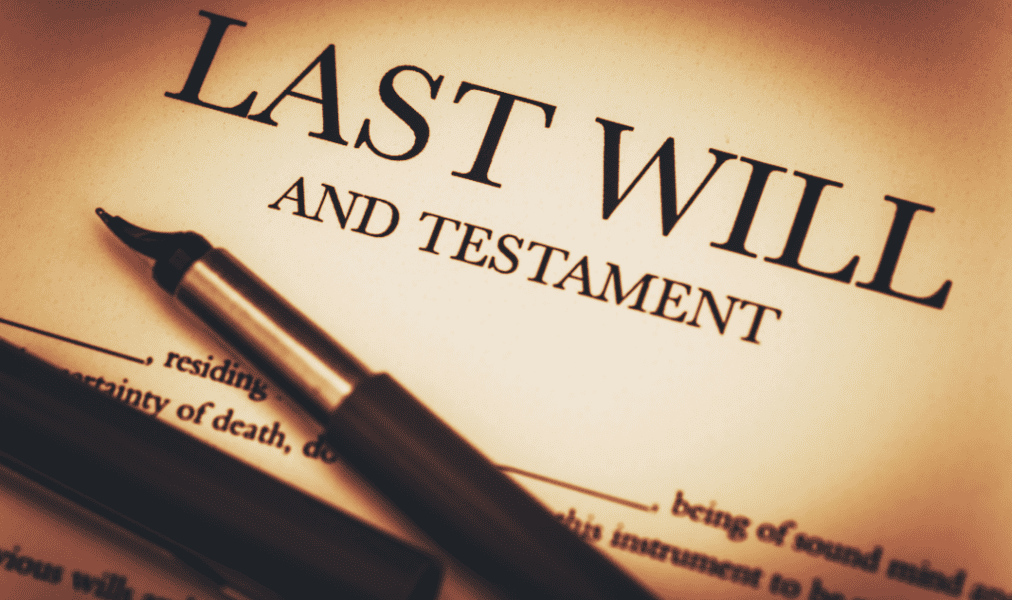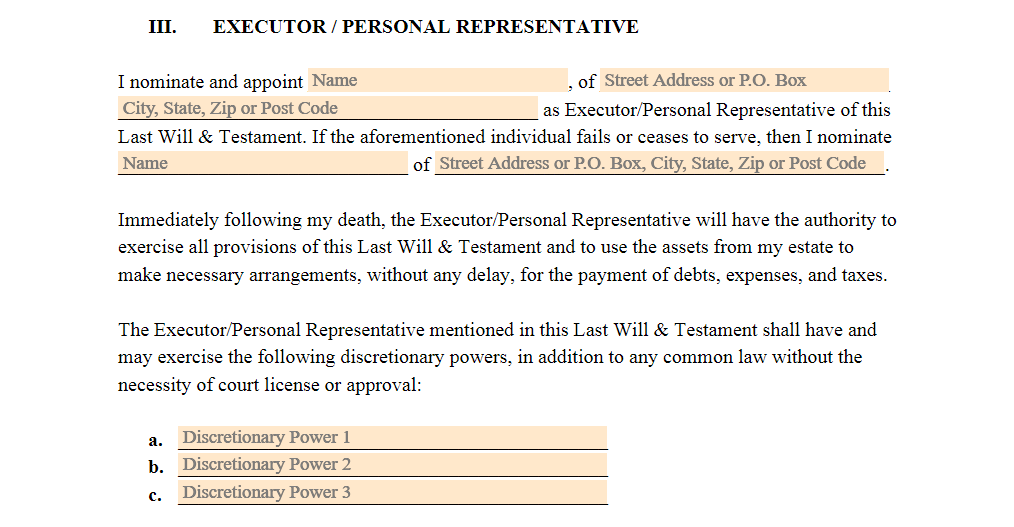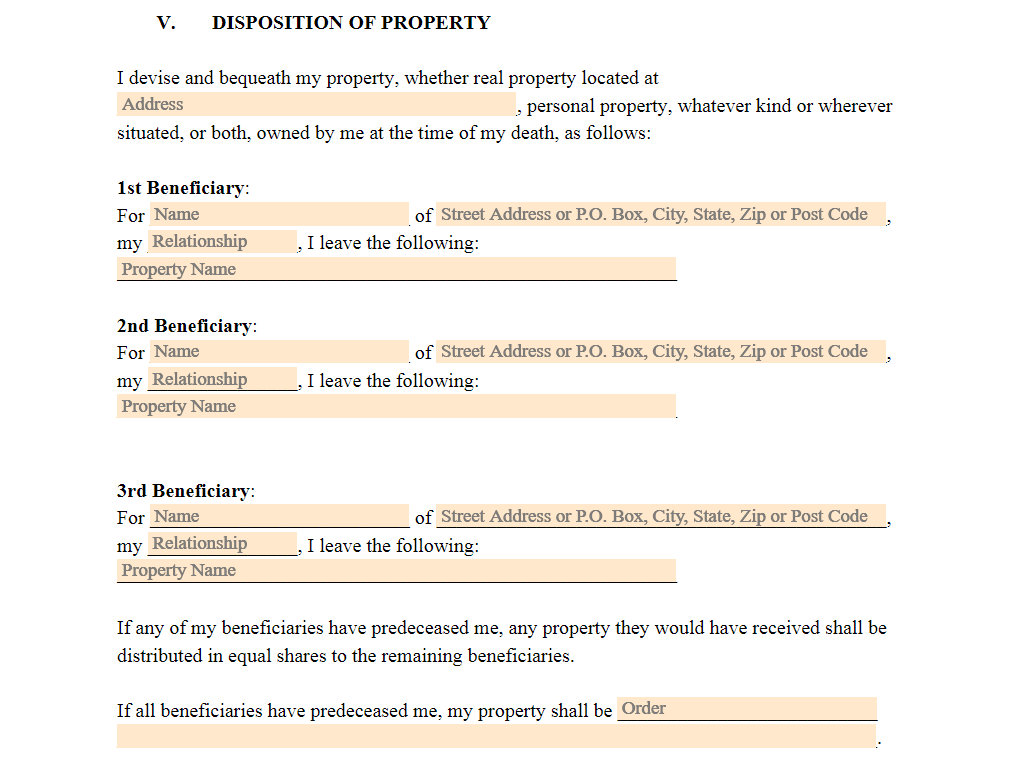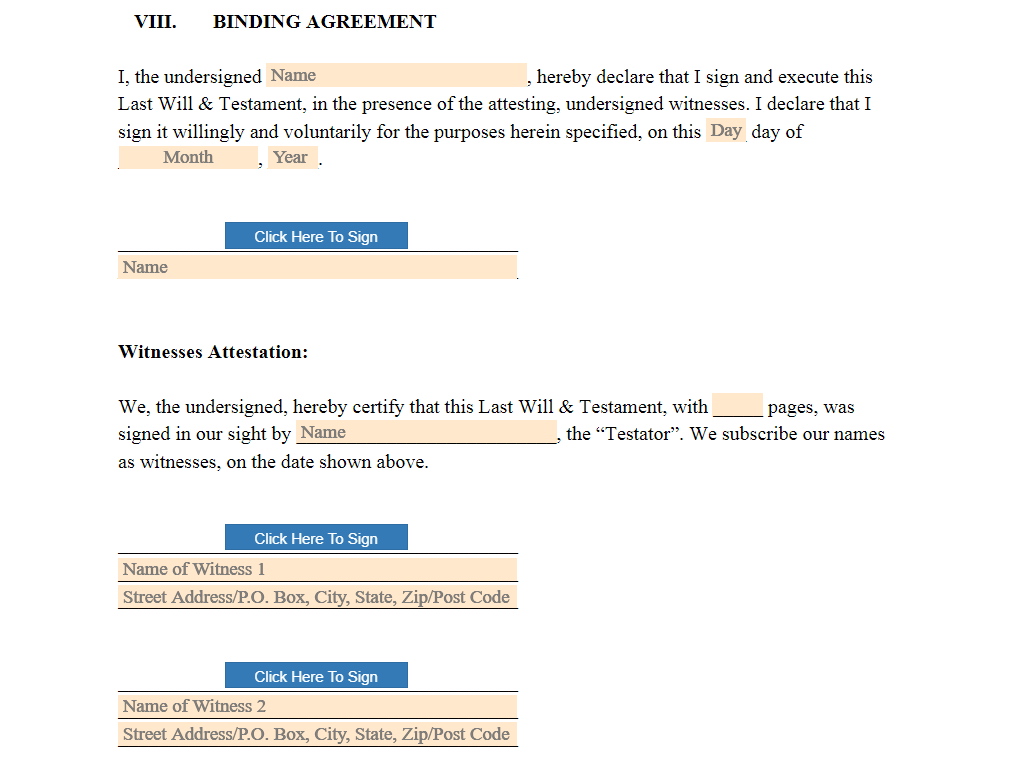Fillable Form Last Will and Testament
A Last Will and Testament is a legal document outlining your wishes for how your property and affairs are to be handled when you pass away. It allows you to control what happens to your estate after your death.
Fill and sign Last Will and Testament online and download in PDF.
What is a Last Will and Testament?

A Last Will and Testament, also referred to as Will, is a legal document that determines what should be done to your assets after you pass away.
If you die without a will, then the court will be the one to decide what happens to your assets.
Why is a last will important?
There are 3 main reasons why a will is important:
- Distribute Your Assets: Ensure your property, money, and belongings go to the people or organizations you choose.
- Appoint a Guardian for Minor Children: Legally designate who will care for your children if you pass away.
- Prevent Family Disputes: Clearly outline your wishes to avoid legal battles and conflicts among heirs.
What are the requirements for a last will?
A valid Last Will and Testament must meet all of the following requirements:
- Your Last Will and Testament must be written or in writing.
- You signed your Last Will and Testament.
- Two witnesses were present when you signed your Last Will and Testament.
- The two witnesses have signed your Last Will and Testament.
What assets should not be in a last will?
Here are the types of properties you must not include in your Last Will and Testament.
- Joint tenancy with right of survivorship: Automatically transfers to the surviving owner if both owners die simultaneously, bypassing probate (e.g., joint bank accounts, real estate).
- Community property: A spouse named as a "life estate" holder inherits the home, regardless of the Will, per community property laws.
- Property held by others: Assets owned by someone else pass to them directly but can be acknowledged with a gift in the Will.
- Trust property: Assets in a living trust, irrevocable trust, or held under power of attorney pass according to the trust terms, not the Will.
- Financial assets with beneficiaries: Life insurance, 401(k)s, and IRAs go directly to named beneficiaries, not the estate.
- Illegal assets: Stolen or unlawfully obtained property cannot be legally distributed in a Will.
How to Make a Will (6 Steps)

-
Get a Last Will and Testament Template
The first thing that you need to do is to get a copy of a last will and testament. You can get a template from PDFRun.
-
Identify the Testator
The testator is the person who is writing the will.
-
Appoint Roles
There are four roles that the testator should appoint. These are the following:
- Personal Representative
- Digital Profile Manager
- Guardian for Minor Children
- Guardian for Pets
-
Decide for Inheritance
To avoid disputes, you should decide who will inherit which part of your assets. Try to be as specific as you can to avoid misunderstandings. Make sure you use the full legal names of people.
-
Get Signatures
To make a will valid, it must be signed by two (2) witnesses who hold no interest in the will. However, some states also require it to be notarized.
-
Make Copies
The family attorney and beneficiaries should have original copies of the will for future reference.
How to fill out a Last Will and Testament Template?
Get a copy of Last Will and Testament template in PDF format.
Using PDFRun’s Last Will and Testament template, you can create one in minutes.
Before proceeding, as a legal rule, review your state’s laws on the creation of a Last Will and Testament to avoid any legal issues.
Follow this step-by-step guide to fill it out:
Section I. Declaration

- Name
Provide your full legal name.
- Address
Provide your full address including the street address, city, state, and ZIP code
Section 2. Identification of Family

If applicable, provide the name of your spouse and your children.
- Name of Spouse
Enter the full legal name of the person you are married to.
- Name of Children
Enter the full legal name of each child you have.
Section 3. Executor / Personal Representative

This section contains details about your appointed executor or personal representative.
This individual will have the authority to execute all your wishes concerning the legal and financial matters of your properties.
He/she should be 18 years old or older and have not been convicted of a felony.
- Name of Personal Representative
Enter the full legal name of your appointed Executor or Personal Representative.
- Address of Personal Representative
Enter the address of the personal representative, including the street address, city, state, and ZIP code.
- Name of Back-up Personal Representative
Enter the full legal name of your back-up personal representative.
- Address of Back-up Personal Representative
Enter the address of your back-up personal representative.
- Discretionary Powers
List down the discretionary powers that you intend your personal representative to have
Section 4. Payment of Debts, Expenses, and Taxes

This section determines how your debts, funeral expenses, and taxes will be paid after your death.
Section 5. Disposition of Property

Provide the names and addresses of your beneficiaries and the properties that you will leave them with after you pass away.
Tip: Before writing your will, you need to identify your assets first. Create an itemized list of all your valuable assets, personal and real properties, so you will not miss one.
- Address of Property
Enter the address where the property is located.
- Name of Beneficiary
Enter the full legal name of each beneficiary.
- Address of Beneficiary
Enter the address of each beneficiary.
- Relationship with Beneficiary
Indicate your relationship with each beneficiary.
- Name of Property Given to Beneficiary
Enter the name of the property that each beneficiary will inherit.
Section 6: Disputing Beneficiary

This section determines what happens to the shares given to a beneficiary if he or she contests or attacks your Last Will and Testament.
Section 7: Governing Law

This section states which state this document will legally fall under.
- State
Provide the state where you live.
Section 8: Binding Agreement

This section contains the signatures of the testator and witnesses.
The witnesses should also validate your Last Will and Testament by confirming the number of pages of the document and providing their names, addresses, and signatures.
- Name of Undersigned
Enter your full legal name.
- Date Signed
Enter when the last will and testament was signed by you.
- Signature
Input your signature in the provided field.
- Number of Pages
Enter the number of pages the last will and testament has.
- Name of Witness
Enter the full legal name of each witness.
- Address of Witness
Enter the address of each witness.
- Signature of Witness
Have the witnesses input their signatures on the provided fields.
Start filling out a Last Will and Testament sample and export in PDF.
Frequently Asked Questions (FAQs)
Are life insurance policies included in a Last Will and Testament?
No, do not include life insurance policies in your Last Will and Testament. Insurance policies are payable to the person named as the beneficiary under the policy terms, not to your estate. In other words, if you named your wife as the primary beneficiary on your life insurance policy, she will receive that money directly from the insurance company, and it will not be part of your estate. In most cases, the insurance company will require a death certificate if your wife is to collect on your life insurance policy.
However, under certain circumstances, you can make a Pour-Over Will and include items that would not normally pass through probates, such as a bank account, real estate, and other assets, in your Last Will and Testament.
Contact a professional to get legal advice on preparing a Last Will and Testament.
What are probate assets?
Probate assets are assets that are subject to probate proceedings at death. These types of assets are valued and distributed according to state law. They include cash, investments, real estate, and personal belongings but may exclude life insurance policies, most retirement accounts (401ks, IRAs), and certain property that passes outside of the will.
Where to begin with a Last Will and Testament?
Begin by naming an executor who can carry out your final wishes. Decide how you want your property divided, making sure everyone gets something. That way, they are satisfied with their inheritance. Make sure you do not overlook any assets, such as bank accounts and investment portfolios, and take care to avoid probate.
What should be included in a Last Will and Testament?
Describe how you would like your property distributed at death. Specify or identify who gets what and how much. Decide whether you want someone else to handle this for you or whether you would like to take care of it yourself. Specify if your children will be minors at the time of death and, if so, what arrangements you want to be made for them until they are old enough to receive their inheritance.
Can I make my own Last Will and Testament?
Yes, you can make your own Last Will and Testament. However, you must be 18 years of age or older and have the testamentary capacity to write a Last Will and Testament. You must have a sound mind and judgment to maintain the disposal of your property. In other words, you must know what you are doing when you write out your Last Will and Testament.
Although not required, it is advisable to hire an attorney to review your Last Will and Testament and educate you about estate planning in general. The attorney can assist you in simplifying the process and provide an unbiased opinion of your choices and their impact on your family and assets.
What happens if the beneficiary in your Last Will and Testament dies before you do?
If you give someone a gift of property in your Last Will and Testament, that person will receive the gift. However, if the beneficiary predeceases you, then that person will not receive your gift. You may revise your Last Will and Testament or add provisions using a Codicil to name a new beneficiary.
No state law exists for this type of situation. However, if you provide specific instructions in your Last Will and Testament about what should happen if the beneficiary predeceases you, that provision will be enforced by a court.
What happens if I die without a Last Will and Testament?
If you die without a Last Will and Testament, your properties will pass according to the distribution scheme under intestate succession laws. It means that your assets will be distributed to family members as set out by state law.
Your spouse and children, if any, will receive your property as determined by the law. However, if there is no surviving spouse or child, your estate may pass to another relative who might not be someone you would have chosen to inherit from you.
What are the three conditions to make a Last Will and Testament valid?
The three conditions to meet to make a valid Last Will and Testament to are:
- You must have the legal capacity to make a will. If you are under age 18, your parents or guardians must sign your Last Will and Testament. If you are physically unable to sign your Last Will and Testament, another person 18 years of age or older can sign the will for you. If you are an emancipated minor or have been legally declared competent to manage your own affairs, then the court may accept the signature of your child, who is at least 18 years of age.
- You must have a sound mind when drafting and signing your Last Will and Testament. If you cannot think clearly about the distribution of assets, then a court may challenge the validity of your Last Will and Testament because you lacked testamentary capacity. For example, if you were drunk or under medication at the time you signed your Last Will and Testament, then it may be invalid.
- Your signature on the will must be properly acknowledged. It implies that two persons must witness you sign and acknowledge the Last Will and Testament.
If you do not meet these conditions, your Last Will and Testament will be considered invalid.
Can I make my minor children beneficiaries in my Last Will and Testament?
Yes, you can name your minor children as beneficiaries in your Last Will and Testament. However, the custodian of the child will be charged with distributing and managing your child's inheritance according to state law. If you do not name a custodian or if the designated custodian refuses to serve in that role, then a court may appoint someone to take charge of managing your minor children's inheritance until they reach the age of majority or when they turn 18.
When can I revise or change my Last Will and Testament?
You have the right to make changes or revoke your Last Will and Testament at any time before you die. A Codicil is a legal document or form that revises or amends your current Last Will and Testament. If you choose to do so, it must be signed and witnessed in the same manner as required for your original Last Will and Testament.
What makes a Last Will and Testament null and void?
A Last Will and Testament is null and void if the deceased person was asked to sign it under duress, coercion, or manipulation. Your Last Will and Testament must not be executed under any type of pressure by individuals trying to control your decisions. It should represent your genuine wishes; otherwise, it may be declared invalid by a court.
Your Last Will and Testament will also be invalid if you did not follow the proper steps in the execution of the document. It happens if you did not sign the will in the presence of two witnesses and a notary public.
A number of other factors can determine the validity of your Last Will and Testament, so you should have a lawyer review your will.
What makes a Last Will and Testament contested?
A Last Will and Testament is contested if there are disagreements among the beneficiaries or family members after you die. The disagreements may be about who will inherit your personal property with respect to your wishes, or it may be over whether there was undue influence by another person when preparing the Last Will and Testament.
Generally, a Codicil correcting mistakes in your original Last Will and Testament can resolve many contested Last Will and Testament issues. However, if the mistake is major or there is evidence of fraud or duress in your Last Will and Testament, you may consider drafting a new Last Will and Testament.
What types of factors may influence my children to contest a Last Will and Testament?
Your children may contest your Last Will and Testament if you did not include them in the distribution of your property. Other reasons for contests are suspicions of fraud or duress on the part of another person helping to prepare the Last Will and Testament, misstatements, mistakes, and omissions, lack of knowledge about the contents, undue influence by another person, and lack of capacity due to mental incapacitation.
The distribution of your estate in a Last Will and Testament may also cause disagreements between your children. If you leave a greater share to one child than the others, or if you disinherit one or more children completely without any reason, then the ones who were left out may contest the Last Will and Testament.
Is a homemade Last Will and Testament legal?
As long as your homemade Last Will and Testament is in writing, meets the requirements for execution, and states your wishes regarding the distribution of your estate, then it is legal. However, you should have a lawyer review any homemade Last Will and Testament before you die because certain statements or provisions may cause problems with its validity.
What are some common mistakes in Last Wills and Testaments?
There are several mistakes that people commonly make when writing or executing Last Will and Testaments.
Some common mistakes in drafting include:
- leaving out important family members;
- failing to revoke an earlier will;
- distributing property at different times;
- giving away property without regard to laws on gifts and estates; and
- leaving property to someone's estate instead of leaving it directly.
Some common mistakes in execution include:
- not signing and dating the Last Will and Testament;
- failing to have it witnessed and notarized; and
- not following the procedures for revocation.
What happens if a Last Will and Testament is not notarized?
You can still make a Last Will and Testament without having it notarized, but it will not be valid unless the credible witnesses acknowledge that you appeared to be of sound mind when signing.
Most states require a Self-Proving Affidavit to be attached to the Last Will and Testament, so your executor does not have to find or notify the witnesses who signed it.
A Self-Proving Affidavit is a sworn statement from all of the witnesses that they saw you sign it and that, to the best of their knowledge, you were of sound mind when doing so.
Who can serve as my witnesses in my Last Will and Testament?
Anyone over 18 years old who is not listed in your Last Will and Testament or not your spouse, blood relative, or the executor named in your Last Will and Testament can be a witness.
Your witnesses must be disinterested parties who are not entitled to receive any property in your Last Will and Testament.
Do I need a lawyer to make my Last Will and Testament?
No, a lawyer is not required when you make your Last Will and Testament. However, you must have your Last Will and Testament reviewed by a qualified estate planning attorney.
You may need a lawyer's advice if problems with the validity of your Last Will and Testament arise or if you want to change the provisions later. Your lawyer can also help minimize any tax burden that will be placed on your estate.
How do I prove a Last Will and Testament?
A Self-Proving Affidavit can be attached to a Last Will and Testament to prove its validity. If your executor cannot find the witnesses who signed your Last Will and Testament, he or she can get copies of the affidavits from you and file them with the court instead.
Most states require a Self-Proving Affidavit to be attached to your Last Will and Testament in order for it to be considered valid. It will reduce the time and effort necessary to prove your Last Will and Testament after you die.
The use of a Self-Proving Affidavit is especially advantageous in situations where someone contests the validity of your Last Will and Testament or says that it was forged. When this happens, the burden will be on them to prove that you did not sign the document and were of unsound mind when doing so.
How much should it cost to make a Last Will and Testament?
The cost of making a Last Will and Testament depends on several factors, including where you live and whether or not you decide to hire a lawyer. An experienced estate planning attorney may charge between $500 and $2,000 to prepare a Last Will and Testament for you.
However, you can make your own Last Will and Testament without any legal assistance and spend as little or as much as you want.
Can I just write a Last Will and Testament on a piece of paper?
No, you cannot make a valid Last Will and Testament if you simply write it on a piece of paper.
Preparing a Last Will and Testament requires a special format and specific language in order to make it valid. You cannot simply draft it yourself on a piece of paper and hope it will meet state requirements.
A qualified estate planning attorney may help you prepare your Last Will and Testament properly. Otherwise, you should have your Last Will and Testament reviewed by a professional to determine if it is valid under the law.
What is the cheapest way to make a Last Will and Testament?
The cheapest way to make a Last Will and Testament is to prepare it yourself without using any legal assistance. You can get generic Last Will and Testament templates online.
Regardless of the cost to make a Last Will and Testament, you must prepare it in accordance with state law in order for it to be valid.
Do banks make Last Will and Testaments?
Most commercial banks do not prepare or provide Last Will and Testaments. If the bank is a trustee of your trust, you should check with it to see how it can help when you die.
How long does a Last Will and Testament remain valid?
A Last Will and Testament remains valid until the person who made it dies or revokes it with another legal writing. If no subsequent Last Will and Testament has been prepared, it will be automatically revoked.
When a new Last Will and Testament is drawn up, your previous Last Will and Testament becomes invalid. If there are provisions in the old Last Will and Testament that you no longer want to remain valid after it is revoked, they must be explicitly canceled by reference to them in the new document.
How long after someone dies can a Last Will and Testament be contested?
A Last Will and Testament can be contested any time after you die. In some states, the amount of time after your death is limited. In most cases, a Last Will and Testament cannot be contested more than six months or one year after it is filed with the probate court
Create a Last Will and Testament document, e-sign, and download as PDF.
Keywords: Last Will Statement Will Testament Will Statement Last Will Last Will Template Will Format Last Will and Testament PDF
















